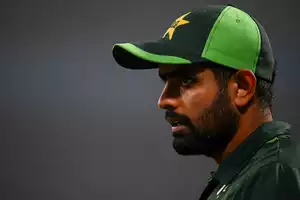
When the dust settles…
… it’s not settling any time soon. It rarely ever does in Pakistan cricket, and it’s no different now. It’s in a perpetual state of flux. Babar Azam has already stepped down as captain across formats and in another three months, a new Prime Minister is expected to hold office; with it, there could also possibly be a new Chairman. But…
While Pakistan’s campaign may have come to an end, the 2023 World Cup is still in its final stages. The chief selector resigned mid-way through the campaign, the bowling coach resigned a few days earlier, the entire coaching staff has been overhauled and according to reports by Samaa TV, the entire selection committee has been sacked too. There are also strong indications that some of other key coaching staff could be pushed to resign soon. By the time you read this piece, a lot more would’ve unfolded. And it’s not even an exaggeration.
It was a campaign marred by off-field controversies between the board and the team – allegations of conflict of interest, leaked chats, discontent and subtle threats. The on-field performance wasn’t any better. The team, ranked number one only a few weeks before the start of the tournament, flattered to deceive. The batters were inconsistent, the pacers blew hot and cold, and the spinners and the fielders became a liability.
Moreover, the captaincy by Babar Azam was uninspiring. As Mickey Arthur put it, they finished fifth on the table because that’s where they deserved to finish. That they finished as high as they eventually did also had much to do with the fact that three other teams (England, Bangladesh and Sri Lanka) also had underwhelming campaigns
By the time the dust really settles, it’s uncertain who the captain, the coach and the selectors are going to be, and what they will take from the World Cup campaign in their bid to move forward. Much like it transpired through their entire tournament, big decisive events are unfolding in Pakistan Cricket almost on a daily basis.
Amidst all the non-cricketing drama, there will be one concern that will be hard for even the new regime to beat, irrespective of the direction they choose to take – a desperate need to identify and prepare a pool of quality spinners, a department that came exposed during the tournament.
A match they’d gladly re-watch the highlights of
The record run-chase against Sri Lanka. There were two aspects in the game that stood out. Firstly, how they pulled back the momentum back with the ball, conceding at less than run-a-ball in the last nine overs, ensuring that Sri Lanka who were looking on course to touch 400 were limited to less than 350. And secondly, to see their their weaker suit (batting) click – the emergence of Abdullah Shafique and Mohammad Rizwan’s gritty ton battling cramps (and “sometimes acting” in his own words). Above all, it was the kind of game where the crowd vocally egged them on.
A match they would have loved to replay immediately
The loss to Afghanistan. It was possibly their most insipid performance, coming at the back of two losses. The batters set an under-par total, the bowlers failed to create chances and the fielding was abysmal. A collective failure in a contest they should’ve ideally won, one they would rue eventually in the end.
A performance to remember
Fakhar Zaman returned to the side following a poor run of form and injuries to help Pakistan to one of the unlikeliest of chases in the rain-marred encounter against New Zealand in Bangalore. The southpaw blazed away to an unbeaten 81-ball 126 in the 402-run chase. Pakistan managed to score 200 for 1 in 25.3 overs, leading DLS by 21 runs when rain ensured there was no further play.
Hits and Misses
Abdullah Shafique made a strong impression early on, marking his World Cup debut with a century in Pakistan’s record run chase against Sri Lanka. In a way, he solved Pakistan’s concerns at the top of the order, with both the other openers in the team falling to fire. He followed that knock with three more fifties in the tournament – against Afghanistan, Bangladesh and Australia – and cemented his place at the top.
On the flip side, Shadab Khan the 50-over bowler came exposed. His loop, turn, and variations all went missing. His lengths especially were awry and he ended the tournament with only two wickets (of Pathum Nissanka and Vikramjit Singh). While he made some useful contributions with the bat and remained Pakistan’s best fielder, his bowling was a major concern. In fact, in the game against South Africa, he wasn’t even brought on to bowl.
Think I’ve played my last World Cup game…
The good news for Pakistan, despite its underwhelming campaign, is that it was a fairly young squad. Most of the players came from the 2016-17 batch, and still have age on their side to play a couple of more editions of the tournament if it comes down to that. Iftikhar Ahmad, who is the oldest of the lot, recently turned 33.







